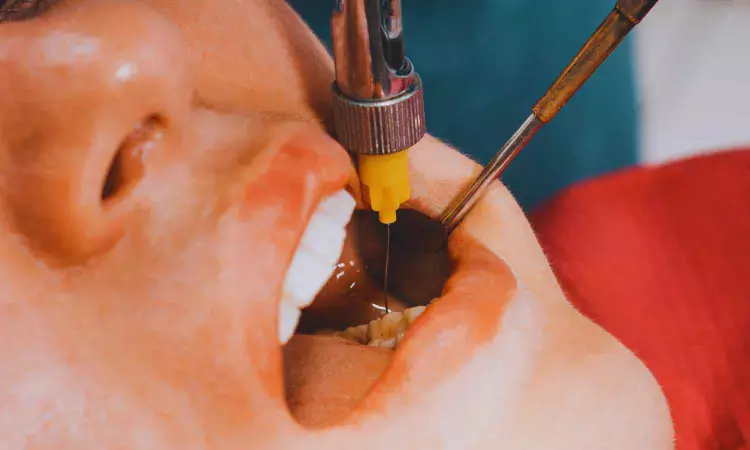- Home
- Medical news & Guidelines
- Anesthesiology
- Cardiology and CTVS
- Critical Care
- Dentistry
- Dermatology
- Diabetes and Endocrinology
- ENT
- Gastroenterology
- Medicine
- Nephrology
- Neurology
- Obstretics-Gynaecology
- Oncology
- Ophthalmology
- Orthopaedics
- Pediatrics-Neonatology
- Psychiatry
- Pulmonology
- Radiology
- Surgery
- Urology
- Laboratory Medicine
- Diet
- Nursing
- Paramedical
- Physiotherapy
- Health news
- Fact Check
- Bone Health Fact Check
- Brain Health Fact Check
- Cancer Related Fact Check
- Child Care Fact Check
- Dental and oral health fact check
- Diabetes and metabolic health fact check
- Diet and Nutrition Fact Check
- Eye and ENT Care Fact Check
- Fitness fact check
- Gut health fact check
- Heart health fact check
- Kidney health fact check
- Medical education fact check
- Men's health fact check
- Respiratory fact check
- Skin and hair care fact check
- Vaccine and Immunization fact check
- Women's health fact check
- AYUSH
- State News
- Andaman and Nicobar Islands
- Andhra Pradesh
- Arunachal Pradesh
- Assam
- Bihar
- Chandigarh
- Chattisgarh
- Dadra and Nagar Haveli
- Daman and Diu
- Delhi
- Goa
- Gujarat
- Haryana
- Himachal Pradesh
- Jammu & Kashmir
- Jharkhand
- Karnataka
- Kerala
- Ladakh
- Lakshadweep
- Madhya Pradesh
- Maharashtra
- Manipur
- Meghalaya
- Mizoram
- Nagaland
- Odisha
- Puducherry
- Punjab
- Rajasthan
- Sikkim
- Tamil Nadu
- Telangana
- Tripura
- Uttar Pradesh
- Uttrakhand
- West Bengal
- Medical Education
- Industry
Sweet Vanilla Scent Reduces Injection Pain during anesthesia for maxillary molars in Children: Study

A study found that a 2% sweet vanilla scent effectively distracted children aged 7-9 years, reducing injection pain during infiltration anesthesia for maxillary molars. The findings suggest that simple sensory interventions may help ease pediatric dental anxiety and discomfort.
Published in Journal of Integrative & Complementary Medicine (Shadman et al., 2025), the randomized, double-blind, controlled trial involved 48 children in need of local anesthesia for primary maxillary molars.
The children were split into three groups: a control group with no scent, a group that received anesthesia in a room filled with 2% vanilla scent, and a group exposed to the vanilla scent for 30 seconds before injection. Pain was assessed using both subjective scales (Wong-Baker Faces Pain Rating Scale) and objective scales (FLACC behavioural pain scale), along with physiological measures like heart rate and oxygen saturation. Results showed significantly lower FLACC scores and reduced heart rates in the scented intervention groups compared to control. Oxygen saturation was also better when using the scented room condition. However, the Wong-Baker self-report scores did not differ significantly across groups.
What this really means is that vanilla aromatherapy, which costs little and is easy to implement, could be a useful non-pharmacological strategy in pediatric dentistry. Though subjective pain didn’t always change, the behavioural and physiological responses suggest that children experienced less distress. The authors do note the need for larger trials and testing in other age ranges to confirm and generalize the findings.
Dr. Shravani Dali has completed her BDS from Pravara institute of medical sciences, loni. Following which she extensively worked in the healthcare sector for 2+ years. She has been actively involved in writing blogs in field of health and wellness. Currently she is pursuing her Masters of public health-health administration from Tata institute of social sciences. She can be contacted at editorial@medicaldialogues.in.
Dr Kamal Kant Kohli-MBBS, DTCD- a chest specialist with more than 30 years of practice and a flair for writing clinical articles, Dr Kamal Kant Kohli joined Medical Dialogues as a Chief Editor of Medical News. Besides writing articles, as an editor, he proofreads and verifies all the medical content published on Medical Dialogues including those coming from journals, studies,medical conferences,guidelines etc. Email: drkohli@medicaldialogues.in. Contact no. 011-43720751


